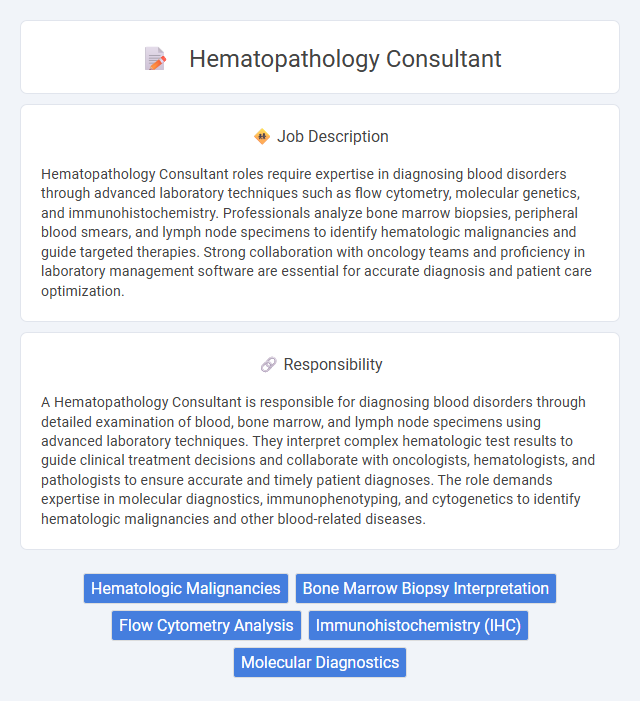
Hematopathology Consultant roles require expertise in diagnosing blood disorders through advanced laboratory techniques such as flow cytometry, molecular genetics, and immunohistochemistry. Professionals analyze bone marrow biopsies, peripheral blood smears, and lymph node specimens to identify hematologic malignancies and guide targeted therapies. Strong collaboration with oncology teams and proficiency in laboratory management software are essential for accurate diagnosis and patient care optimization.
Individuals with strong analytical skills and a deep interest in hematology are likely well-suited for a Hematopathology Consultant role. Those who thrive in detailed laboratory work and enjoy diagnosing complex blood disorders may find this career particularly fulfilling. People who struggle with high-pressure environments or lack patience for meticulous examination might face challenges in this field.
Qualification
A Hematopathology Consultant must possess a medical degree with specialized training in pathology and hematopathology, typically requiring board certification in hematopathology or an equivalent subspecialty. Extensive experience in diagnosing blood disorders, bone marrow diseases, and lymphoid tissue pathologies through microscopic examination and molecular diagnostics is essential. Proficiency in utilizing advanced laboratory techniques, maintaining compliance with clinical standards, and collaborating with multidisciplinary teams enhances the consultant's effectiveness in delivering precise hematologic diagnoses.
Responsibility
A Hematopathology Consultant is responsible for diagnosing blood disorders through detailed examination of blood, bone marrow, and lymph node specimens using advanced laboratory techniques. They interpret complex hematologic test results to guide clinical treatment decisions and collaborate with oncologists, hematologists, and pathologists to ensure accurate and timely patient diagnoses. The role demands expertise in molecular diagnostics, immunophenotyping, and cytogenetics to identify hematologic malignancies and other blood-related diseases.
Benefit
A Hematopathology Consultant position likely offers the benefit of working with advanced diagnostic technologies, enhancing professional expertise in blood disorders and malignancies. The role probably provides opportunities for collaboration with multidisciplinary teams, improving clinical decision-making and patient outcomes. Competitive compensation and access to continuous medical education resources may also be expected advantages.
Challenge
Hematopathology consultant roles likely involve navigating complex diagnostic challenges due to the intricate nature of blood disorders and malignancies. Professionals in this field may often face the probability of encountering ambiguous cases requiring advanced interpretation of laboratory tests and integration of clinical data. The role probably demands continual learning and adaptation to emerging hematologic techniques and evolving disease classifications to ensure accurate diagnoses and effective patient management.
Career Advancement
A Hematopathology Consultant specializes in diagnosing blood diseases by analyzing bone marrow, blood, and lymph nodes, playing a critical role in patient care and clinical decision-making. Career advancement opportunities include leading specialized laboratories, engaging in cutting-edge research, and contributing to medical education or healthcare policy development. Expertise in hematopathology enhances prospects for roles such as senior consultant, laboratory director, or academic faculty member in prestigious medical institutions.
Key Terms
Hematologic Malignancies
A Hematopathology Consultant specializes in diagnosing hematologic malignancies such as leukemia, lymphoma, and myeloma through the analysis of blood, bone marrow, and lymph node biopsies. Expertise in immunophenotyping, molecular diagnostics, and cytogenetics is essential for accurate disease classification and guiding targeted treatment strategies. Collaboration with oncologists and clinical teams ensures comprehensive patient management and optimal therapeutic outcomes.
Bone Marrow Biopsy Interpretation
Hematopathology consultants specializing in bone marrow biopsy interpretation play a critical role in diagnosing hematologic disorders such as leukemia, lymphoma, and myelodysplastic syndromes. Accurate evaluation of bone marrow specimens involves analyzing cellular morphology, identifying abnormal cell populations, and integrating clinical and laboratory data to guide treatment decisions. Expertise in immunohistochemistry, flow cytometry, and molecular studies enhances diagnostic precision and patient management in complex hematologic cases.
Flow Cytometry Analysis
Hematopathology Consultant roles require expertise in diagnosing blood disorders through advanced Flow Cytometry Analysis, which enables detailed cell population identification and immunophenotyping. Proficiency in interpreting multiparametric flow cytometry data is critical for accurate detection of hematologic malignancies such as leukemia and lymphoma. These specialists collaborate closely with clinical teams to provide precise diagnostic insights that guide targeted treatment strategies.
Immunohistochemistry (IHC)
Hematopathology Consultants specializing in Immunohistochemistry (IHC) utilize advanced staining techniques to diagnose hematologic malignancies and monitor disease progression. Their expertise in IHC markers, such as CD20, CD3, and Ki-67, enables precise classification of lymphomas and leukemias, directly influencing targeted treatment strategies. Proficiency in interpreting IHC results enhances diagnostic accuracy and supports personalized patient management in complex hematopathological cases.
Molecular Diagnostics
Hematopathology consultants specializing in Molecular Diagnostics analyze genetic and molecular markers to diagnose and classify hematologic disorders accurately. Expertise in techniques such as PCR, FISH, and next-generation sequencing enables precise identification of mutations and chromosomal abnormalities critical for targeted therapy decisions. Collaborating closely with clinical teams, these consultants contribute to personalized treatment plans by integrating molecular test results with pathological and clinical data.
 kuljobs.com
kuljobs.com